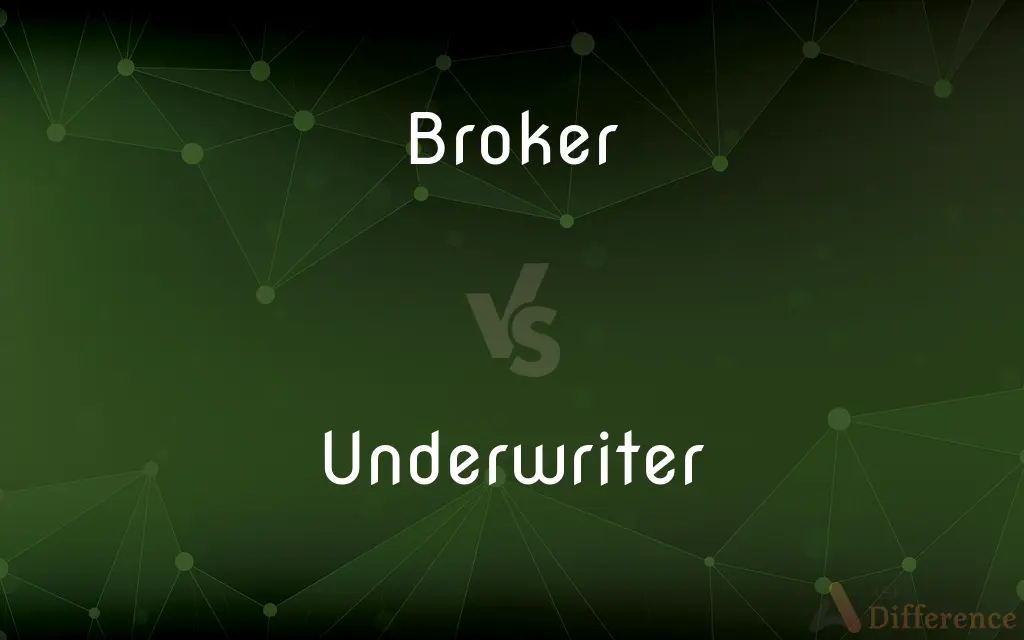Broker vs. Underwriter — What's the Difference?
By Fiza Rafique & Maham Liaqat — Updated on April 25, 2024
Brokers connect clients with insurers to find the best coverage, whereas underwriters assess and decide on the risk of insuring clients.

Difference Between Broker and Underwriter
Table of Contents
ADVERTISEMENT
Key Differences
Brokers act as intermediaries between clients looking for insurance and insurance companies, focusing primarily on understanding the client's needs and finding suitable insurance policies. Whereas, underwriters work within insurance companies and their main role is to evaluate the risks associated with insuring a person or asset and deciding the terms of coverage.
Brokers do not make decisions on insurance policy terms; they gather information from clients and present it to insurers, aiming to secure the best terms for their clients. On the other hand, underwriters analyze this information to assess risk levels and determine whether to offer insurance and at what premium rate.
In terms of client interaction, brokers maintain direct contact with clients throughout the insurance process, advising them on the most appropriate policies and handling their questions and concerns.
Underwriters, however, typically have limited direct interaction with clients, as their focus is more on risk assessment and decision-making based on the information provided by brokers.
Brokers earn their income primarily through commissions and fees paid by their clients for securing insurance coverage. In contrast, underwriters are usually salaried employees of the insurance companies for which they work, reflecting their role in risk management and policy decision-making.
ADVERTISEMENT
The success of a broker is measured by their ability to retain clients and secure new ones by offering reliable, customer-focused service. Meanwhile, the success of an underwriter is gauged by the accuracy of their risk assessments and the profitability of the insurance policies they underwrite.
Comparison Chart
Role
Acts as intermediary between clients and insurers
Assesses risks and decides on insurance terms
Decision-making
Does not decide on policy terms
Makes decisions on policy terms and premiums
Client Interaction
Direct and ongoing
Limited and indirect
Income Source
Commissions and fees from clients
Salary from the insurance company
Success Measurement
Client retention and acquisition
Accuracy of risk assessment and policy profitability
Compare with Definitions
Broker
A commercial broker deals specifically with business-related transactions.
A commercial broker arranged the lease for the company’s new office space.
Underwriter
In finance, underwriters are responsible for evaluating the credit worthiness of potential borrowers.
Loan underwriters review credit reports and other financial data to assess loan applications.
Broker
A person who arranges transactions between a buyer and a seller for a commission when the deal is executed.
A real estate broker facilitates the sale of properties.
Underwriter
The term is also used in the securities market, where firms underwrite the risk of new stocks or bonds.
The investment bank acted as the underwriter in the company's initial public offering.
Broker
In the context of insurance, a broker helps clients choose the best insurance policy.
Health insurance brokers advise clients on selecting the best plan based on their medical needs.
Underwriter
Insurance underwriters decide whether to provide insurance and under what terms.
The property’s flood risk was too high for the underwriter to approve standard homeowners insurance.
Broker
A broker can also refer to someone who buys and sells goods or assets for others.
Stock brokers handle transactions of securities on behalf of their clients.
Underwriter
An underwriter assesses and assumes another party's risk for a fee, such as with loans, insurance, or investments.
The underwriter approved the application for the life insurance policy.
Broker
Brokers are often required to be licensed to practice in their field.
Before becoming a licensed broker, one must pass a series of exams and meet certain regulatory requirements.
Underwriter
Underwriters use specialized software and actuarial data to assess risks.
Underwriters analyze historical data on similar risks to make informed decisions.
Broker
A broker is a person or firm who arranges transactions between a buyer and a seller for a commission when the deal is executed. A broker who also acts as a seller or as a buyer becomes a principal party to the deal.
Underwriter
A person or firm engaged in the insurance business.
Broker
One that acts as an agent for others, as in negotiating contracts, purchases, or sales in return for a fee or commission.
Underwriter
An insurance agent who assesses the risk of enrolling an applicant for coverage or a policy.
Broker
A stockbroker.
Underwriter
One that guarantees the purchase of a full issue of stocks or bonds.
Broker
A power broker.
Underwriter
A sponsor, as of a television show.
Broker
To arrange or manage as a broker
Broker an agreement among opposing factions.
Underwriter
An entity assuming a financial risk.
Broker
A mediator between a buyer and seller.
Underwriter
(insurance) A person working for an insurance company who arranges and authorizes an insurance policy with a broker or insured.
Broker
A stockbroker.
Underwriter
(finance) An entity undertaking to market newly issued securities.
They were the underwriters of the company's shares, but only on a "best efforts" basis.
Broker
A mediator in general, one who liaises between two or more parties to attempt to achieve an outcome of some kind.
Underwriter
One who underwrites his name to the conditions of an insurance policy, especially of a marine policy; an insurer.
Broker
(computing) An agent involved in the exchange of messages or transactions.
Underwriter
A banker who deals chiefly in underwriting new securities
Broker
(intransitive) To act as a broker; to mediate in a sale or transaction.
Underwriter
An agent who sells insurance
Broker
(transitive) To act as a broker in; to arrange or negotiate.
Underwriter
A financial institution that sells insurance
Broker
One who transacts business for another; an agent.
Broker
An agent employed to effect bargains and contracts, as a middleman or negotiator, between other persons, for a compensation commonly called brokerage. He takes no possession, as broker, of the subject matter of the negotiation. He generally contracts in the names of those who employ him, and not in his own.
Broker
A dealer in money, notes, bills of exchange, etc.
Broker
A dealer in secondhand goods.
Broker
A pimp or procurer.
Broker
A businessman who buys or sells for another in exchange for a commission
Broker
Act as a broker
Common Curiosities
What kind of data do underwriters analyze?
Underwriters often analyze financial records, credit scores, health information, and even environmental data depending on the type of insurance or loan.
What skills are important for a broker to have?
Effective communication, negotiation skills, and a deep understanding of market conditions and legal requirements are crucial for a broker.
Do brokers work independently or for a company?
Brokers can work independently, operating their own businesses, or they can be employed by brokerage firms, depending on their area of expertise.
What are the differences in career paths for brokers and underwriters?
Brokers may progress to own brokerage firms or specialize in high-value transactions, while underwriters might advance to senior managerial roles or specialize in complex risk assessments.
How do brokers get paid?
Brokers typically earn a commission based on the transactions they facilitate, which is often a percentage of the deal value.
What is the impact of technology on underwriting?
Technology, especially big data analytics and AI, has significantly enhanced the precision of risk assessments, making underwriting faster and more accurate.
What types of insurance policies do brokers deal with?
Brokers can handle a wide range of insurance types, including health, life, property, and casualty insurance, among others.
How do regulatory changes affect underwriters?
Underwriters must constantly adapt to changes in regulations, which can affect how they assess risks and the types of policies they can offer.
Can underwriters reject insurance applications?
Yes, underwriters can reject applications if the risk associated with the applicant is deemed too high or does not meet the company’s criteria.
What ethical considerations do brokers face?
Brokers must navigate ethical considerations such as conflicts of interest, confidentiality issues, and the obligation to act in the best interest of their clients.
What is the typical work environment for an underwriter?
Underwriters usually work in office settings, primarily using computers and other technical tools to analyze risks.
Do underwriters specialize in specific types of risks?
Yes, underwriters often specialize in particular types of risks, such as life, health, automotive, or corporate risks, which require different skill sets and knowledge.
Are brokers required to have specific educational backgrounds?
While a specific degree might not always be necessary, brokers often have degrees in business, finance, or economics, and must possess relevant licenses.
What happens if an underwriter makes an error in their risk assessment?
Errors can lead to financial losses for the insurance company, and depending on the severity, might lead to disciplinary action or adjustments in underwriting processes.
Can a broker also be an underwriter?
While they are distinct roles with different responsibilities, a professional can train to perform both functions, especially in smaller or specialized companies.
Share Your Discovery

Previous Comparison
Leakage vs. Seepage
Next Comparison
Clarity vs. CoherenceAuthor Spotlight
Written by
Fiza RafiqueFiza Rafique is a skilled content writer at AskDifference.com, where she meticulously refines and enhances written pieces. Drawing from her vast editorial expertise, Fiza ensures clarity, accuracy, and precision in every article. Passionate about language, she continually seeks to elevate the quality of content for readers worldwide.
Co-written by
Maham Liaqat















































